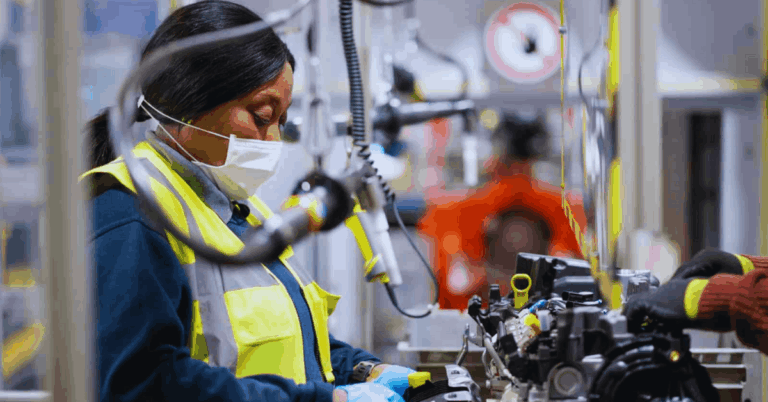Factory jobs are vital to Europe’s economy, offering stable work in various industries.
Whether you’re aiming for manufacturing, automotive, or food production, knowing how to apply is key.
This guide walks you through the steps to help you land a factory job in Europe.
Types of Factory Jobs in Europe
Factory roles in Europe cover a wide range of jobs. Each offers distinct opportunities.
- Manufacturing roles include assembly line workers, machine operators, and quality inspectors. These jobs are the backbone of many industries.
- Skilled positions like mechanics, electricians, and engineers are crucial to factory operations. These roles require more experience.
- Entry-level roles are ideal for beginners. These jobs often come with on-the-job training.
- Experienced roles offer higher pay and more responsibility. These jobs need advanced skills.
- Popular industries for factory jobs include automotive, electronics, food processing, and textiles.
- Seasonal or temporary roles may be available based on production needs. These can be flexible but might not offer long-term stability.

Where to Find Factory Jobs in Europe
Finding the right job requires knowing where to look. Here are some practical resources.
- Job boards like Indeed, Monster, or totaljobs post factory jobs regularly. These sites allow you to filter jobs by location and type.
- Recruitment agencies specialize in filling factory roles. They can help you find jobs, especially if you’re new to the job market.
- Company websites often list job openings directly. Large companies like BMW or Siemens constantly update their career pages.
- Government programs like EURES help EU citizens find work in other European countries. These resources are especially useful for foreigners.
- Networking is a great way to uncover hidden job opportunities. Building connections with industry insiders can give you an edge.
- Job fairs are excellent for meeting recruiters in person. Many companies attend these events to find workers quickly.
Researching Potential Employers
Before applying, it’s essential to research your potential employer.
- Company reviews on sites like Glassdoor can provide insight into work culture and employee satisfaction.
- To understand what they offer, consider company benefits like health insurance, pension plans, and paid leave.
- Check the company’s reputation. A good safety record and solid financials are key indicators of a stable employer.
- Employee feedback on social media or forums can give you a clearer picture of what to expect.
How to Prepare Your Application
A polished application will help you stand out. Here’s how to prepare.
- Tailor your resume to highlight relevant skills and experience. Even entry-level candidates can showcase transferable skills.
- Write a custom cover letter for each job application. Focus on how your skills match the role.
- Highlight your technical skills, such as machine operation or safety procedures. Employers value hands-on experience.
- Ensure you have all necessary documents, like ID, certifications, and references.
- Customize your application to fit each role. A tailored resume shows you’re serious about the job.
The Application Process
Understanding the application process can make it easier.
- Most applications are online. These often require you to fill out a form and upload your resume.
- Some companies may ask for in-person applications. Be ready to submit your resume on-site.
- Follow up with employers to ensure they received your application. This shows your enthusiasm.
- Interviews may involve skill assessments. Be prepared for questions about teamwork, safety, and handling pressure.
- Staffing agencies can help you find temporary or contract roles. These may offer quick placements, but be aware of job security.

Work Visa and Permits
You’ll need a work visa if you’re from outside the EU. Here’s what to know.
- Non-EU nationals must apply for a work visa to work in Europe. Check the visa requirements for the specific country.
- EU nationals don’t need a visa. You can work freely in any EU country.
- Each country has particular work permit requirements. For example, Germany has a straightforward visa process for skilled workers.
- Have all necessary paperwork ready, including proof of health insurance and financial resources.
Salary Overview
Salaries for factory jobs in Europe can vary by country and industry.
- Entry-level salaries typically range from €1,200 to €2,000 per month, depending on the country and role.
- Skilled roles like machine operators or electricians can earn between €2,000 and €4,000 per month.
- In countries like Germany and Switzerland, wages tend to be higher due to the cost of living and strong industries.
- Salaries can also vary by industry. For example, factory jobs in the automotive industry often pay more than in food processing.
- Salary negotiation is essential. If you have experience or specialized skills, negotiate a higher wage.
Benefits
Factory jobs often come with valuable benefits. Here’s what to look for.
- Many companies offer healthcare benefits, covering medical, dental, and vision care.
- Paid leave is standard in most European countries. You’ll receive vacation days, sick leave, and holiday pay.
- Some companies offer transportation allowances or housing assistance, especially for workers from abroad.
- Union representation is common in larger factories, ensuring workers have rights and protections.
- Additional perks may include meal vouchers, overtime pay, and annual bonuses.
Workplace Safety and Labor Laws
Europe has strong workplace safety laws to protect workers.
- Health and safety regulations are strict across Europe. Factories must follow safety standards and provide protective equipment.
- European labor laws ensure workers have rights, like paid leave and reasonable working hours.
- Overtime pay is guaranteed, and workers can report unsafe conditions without fear of retaliation.
- Many European countries require union representation, giving workers a voice in negotiations.
After the Application: What to Expect
Once you’ve applied, here’s what to expect next.
- Be patient while waiting for a response. The hiring process may take a few weeks.
- You’ll undergo onboarding and safety training to prepare for your role if hired.
- Many companies have a probation period where you and the employer assess fit. This lasts a few months.
- If you’re not hired, don’t be discouraged. Seek feedback and apply again. Persistence is key.
The Bottomline
Factory jobs in Europe offer stable work and good benefits across various industries.
Follow this guide, and you’ll be one step closer to landing the right factory job in Europe.
Stay persistent and apply; a rewarding career in a European factory is within reach.












